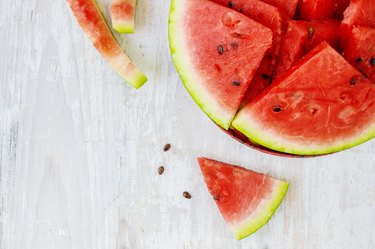
Loaded with potassium, magnesium, lycopene and amino acids, watermelon is one of the most nutritious summer fruits. In fact, it's often referred to as "natural Viagra." Some studies suggest that it may help with erectile dysfunction and boost sexual health.
Watermelon and Workout Performance
Video of the Day
Whether you want to get leaner and fitter or keep your immune system strong, watermelon is a great choice. It provides fewer calories than most fruits and packs high doses of vitamin C. Plus, it's over 90 percent water, keeping you energized and hydrated.
Video of the Day
The USDA reports that each serving (one wedge) boasts more than 25 percent of the daily recommended vitamin C intake and 9 percent of the daily recommended allowance of vitamin A. It's rich in potassium, magnesium and calcium. These minerals balance fluid and electrolyte levels, support nerve, muscle and brain function and promote cardiovascular health.
What you may not know is that watermelon also provides amino acids, such as lysine, arginine, tyrosine and leucine. Amino acids are the building blocks of protein. These nutrients aid in muscle growth and repair, produce "feel good" chemicals and serve as a source of energy. If you work out regularly, amino acids can help you recover faster from training and fuel your gains.
Sure, watermelon won't replace your post-workout snack or protein shakes, but it can speed up muscle repair. Not to mention that it's lower in sugar and calories than most snacks. Additionally, potassium and other electrolytes in this fruit may help prevent muscle cramps, reduce fatigue during exercise and keep your bones strong, points out the National Academy of Sports Medicine.
Watermelon — A Natural Viagra?
This summer fruit is a powerhouse of nutrition. Some studies point out that watermelon benefits for men may include a better sex life and improved prostate health. These effects may be due to its high content of citrulline, arginine and lycopene.
According to a January 2017 review published in Current Opinion in Clinical Nutrition and Metabolic Care, watermelon may help increase arginine levels in the bloodstream and reduce blood pressure in adults with prehypertension or hypertension. Researchers attribute these benefits to l-citrulline, a non-essential amino acid that is converted to arginine in the body.
Citrulline increases vasodilatation and may improve cardiometabolic health, as reported in a July 2018 research paper featured in the journal Nutrients. Furthermore, it may protect against endothelial damage, reduce inflammation and decrease arterial stiffness.
A February 2017 study published in the journal Andrology suggests that l-citrulline may play a role in men's sexual health. Male subjects with erectile dysfunction (ED) had lower levels of citrulline, arginine or both. These findings indicate that increasing levels of these amino acids may help improve ED symptoms.
Another study, which had only 20 participants, supports this theory. Researchers have found that combining L-citrulline and trans-resveratrol may improve erection firmness, sexual satisfaction and the ability to maintain erections in men with ED. The results were published in the December 2018 issue of Sexual Medicine. The study was small, though, so further investigation is needed.
Based on the current evidence, it's fair to say that watermelon won't replace Viagra anytime soon. However, it may improve men's sexual health, among other benefits. Lycopene, one of its key antioxidants, helps reduce oxidative stress and lipid peroxidation, which in turn, may boost male fertility.
Eat Watermelon for Prostate Health
As mentioned earlier, watermelon supports prostate health, largely due to its high antioxidant content. According to a June 2014 review published in the EXCLI Journal, this fruit is one of the best natural sources of readily available lycopene. Red-fleshed varieties provide about 40 times more lycopene than tomatoes.
This antioxidant may protect the prostate gland against iron-induced oxidative stress, as reported in the above review. It also decreases lipid peroxidation, which further enhances its beneficial effects on prostate health. In one study, men with the highest lycopene intakes had a 25 percent lower risk of prostate cancer and a 44 percent lower risk of other cancers.
One serving of watermelon delivers 12689.6 micrograms (12.6 milligrams) of lycopene, according to the USDA. The International Food Information Council Foundation reports that consuming at least 12 milligrams of this antioxidant daily may help reduce high blood pressure. To reap the benefits, aim for about 0.5 milligrams of lycopene per kilogram of body weight.
This nutrient is found in a wide range of fruit and vegetables, not just watermelon. Sun-dried tomatoes, fresh tomatoes, red grapefruit, papaya, red bell peppers, red cabbage, mangoes, asparagus and guavas are all excellent sources of lycopene. Incorporate these foods into your diet for prostate health and general well-being.
- USDA: "Watermelon"
- USDA: "Nutrition Facts for Watermelon"
- U.S. National Library of Medicine: "Fluid and Electrolyte Balance"
- American Council on Exercise: "9 Things to Know About How the Body Uses Protein to Repair Muscle Tissue"
- NASM: "Electrolytes: Performance Perks and Real Food Sources"
- Current Opinion in Clinical Nutrition and Metabolic Care: "Influence of L-Citrulline and Watermelon Supplementation on Vascular Function and Exercise Performance"
- PubChem: "Citrulline - Pharmacology"
- Nutrients: "l-Citrulline Supplementation: Impact on Cardiometabolic Health"
- Andrology: "Levels of L‐arginine and L‐citrulline in Patients With Erectile Dysfunction of Different Etiology"
- Sexual Medicine: "Oral L-citrulline and Transresveratrol Supplementation Improves Erectile Function in Men With Phosphodiesterase 5 Inhibitors: A Randomized, Double-Blind, Placebo-Controlled Crossover Pilot Study"
- Asian Journal of Andrology: "Lycopene and Male Infertility"
- EXCLI Journal: "Watermelon Lycopene and Allied Health Claims"
- International Food Information Council Foundation: "What Is Lycopene?"
- USDA: "Top 10 Foods Highest in Lycopene"